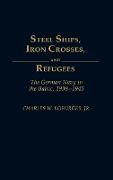Steel Ships, Iron Crosses, and Refugees
BücherAngebote / Angebote:
Steel Ships, Iron Crosses, and Refugees documents the German navy's role in the Baltic, including the final epic amphibious lift in the Baltic and the world's two largest maritime disasters. The small German Navy and Merchant Marines evacuated over 2, 000, 000 refugees, wounded, and troops by sea, without adequate air support and while under Russian fire. During the evacuation, the torpedoing of Wilhelm Gustaloff and GOYA alone resulted in the loss of 12, 000 lives. The magnitude of the loss is overwhelming when compared to Titanic (1, 500 dead) and Lusitania (1, 200 dead). Yet at the end, one out of every 20 West Germans was free because of this effort. Focusing our attention on a little known chapter of modern naval history, this study demonstrates the critical role of sea power and the interrelationship of navy and merchant marine. It also repeats an oft-forgotten lesson on the special characteristics of inshore waters and warfare. Few people know of the Baltic Naval Campaign (1939-1945), which culminated in the tremendous rescue operation that evacuated over 2, 000, 000 people ahead of the advancing Red Army. The Germans suffered the two largest maritime disasters on record.
The already battered German navy was almost totally destroyed during this last campaign. Suggesting that a knowledge of this great humanitarian effort might balance our historical perspective, this volume also reinforces many basic truths concerning the importance and use of sea power.
Folgt in ca. 15 Arbeitstagen




